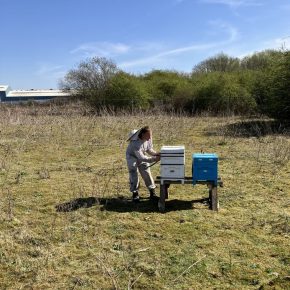
GUEST ARTICLE: Quality and safety in Finnish construction
The Nordic construction industry is known for its excellent sustainability, high-quality architecture and first-class approach to quality and safety. In this article, Timo Makkonen, CEO of Congrid, discusses how Finland’s digital approach to quality and safety is helping the industry become more transparent and collaborative and what lessons the UK could learn.
Finland and the other Nordic countries are well-known for their technological innovations and attitude towards high quality and safety. Safety in Finland for example, is based on standardised methods, designed to meet the obligatory weekly safety measurement which prevents potential hazards and makes sure that site workers get notified of any anomalies.
Having this straightforward and consistent way of measuring safety (which legislation makes mandatory for everyone in the industry) also ensures we are all on the same page and the results are comparable between all parties. And when quality is prioritised, decisions are based on real data and collaboration becomes more transparent between stakeholders, making the delivery of zero-defect buildings a reality. In both cases – quality and safety – the systematic recording and subsequent transparent use of data are key factors to enhancing performance.
This has helped to place quality and safety at the centre of any construction project. The overall impact being a growing importance of mutual practices in quality and safety which everyone benefits from.
Achievements to date
But it was not always like this. For a number of years, pen, paper and Excel files were used to control and manage quality and safety which led to scattered information, data inaccuracy and risk of human error. Very often, large amounts of data can also disappear as a construction project moves from one phase to another if it is not collected in a unified way.
In Finland, many construction projects now collect data digitally in a centralised way and share it afterwards between stakeholders, so they can follow the project simultaneously and access data in the future too. Main contractors and sub-contractors are able to improve and develop their business as they’re aware of any problems that arise during construction, can see how they reacted and ultimately, examine how any issues impacted on project timelines and costs. This consistent and centralised approach has given project stakeholders a deeper understanding of what has been built and how.
What makes it more difficult to do this in the UK is the very long sub-contracting chains compared to Finland, since there is no mutual understanding for those in the chain to be responsible for quality and safety. In Finland, the government has regulated sub-contractor chains to extend only to a handful, instead of having extensive networks of contractors where information can easily scatter.
Data-driven decision making
Further benefits in safety and quality will be gained from data-driven decision making, which is growing in both the Nordics and the UK, as organisations explore the value of data and find new ways to visualise it. Not only to deliver a deeper understanding of risk mitigation and enable workers to react to problems during construction but also to help boost project supervision and offer more transparent project management. We predict that soon the Internet of Things (IoT) and machine learning will supplement data analysis and help site managers make more informed decisions and predict errors before they happen.
A change in mindset
The entire industry must change its mindset towards safety and quality. They are everyone’s business so all parties involved need to participate and take responsibility. And this is what we are now seeing in the UK – a need for smarter ways of working relating to safety and quality and a better understanding of ‘what’ has been built and ‘how’.
When everyone has access to data, understands their role and can take responsibility for quality and safety, better results and customer satisfaction will be achieved. Using digital tools is not new – but understanding how to use them in smarter ways will make a big difference.
Latest news

29th April 2025
Senior pledges to ‘bee’ part of the solution with new biodiversity initiative
Senior Architectural Systems has installed its first on-site beehive, marking another step forward in its commitment to sustainability and biodiversity.
Posted in Articles, Building Industry News, Building Products & Structures, Building Services, Curtain Walling, Doors, Glass, Glazing, Innovations & New Products, news, Restoration & Refurbishment, Retrofit & Renovation, Sustainability & Energy Efficiency, Walls, Windows
29th April 2025
West Fraser range delivering key benefits for South-East carpentry company
An experienced carpenter and building site manager who has recently set up his own company is using high performance panel products from the West Fraser range.
Posted in Articles, Building Industry News, Building Products & Structures, Building Systems, Case Studies, Garden, Restoration & Refurbishment, Retrofit & Renovation, Sustainability & Energy Efficiency, Timber Buildings and Timber Products
29th April 2025
CPD Courses Available Online From Ecological Building Systems
Ecological Building Systems, a leading supplier of natural building products for sustainable construction, has revealed its comprehensive CPD programme for the year ahead.
Posted in Articles, Building Industry Events, Building Industry News, Building Products & Structures, Building Services, Continuing Professional Development (CPD's), Information Technology, Innovations & New Products, Insulation, Restoration & Refurbishment, Retrofit & Renovation, Seminars, Sustainability & Energy Efficiency, Training, Walls, Waste Management & Recycling
29th April 2025
WindowBASE launches new prospect databases at FIT Show
Visit WindowBASE at the FIT Show to see first-hand how it helps companies find new customers – the company is launching an easy-to-use, intuitive platform on Stand G16 at the NEC Birmingham from 29th April – 1st May.
Posted in Articles, Building Industry Events, Building Industry News, Building Products & Structures, Building Services, Doors, Exhibitions and Conferences, Glass, Glazing, Information Technology, Innovations & New Products, Posts, Publications, Research & Materials Testing, Restoration & Refurbishment, Retrofit & Renovation, Windows
 Sign up:
Sign up: